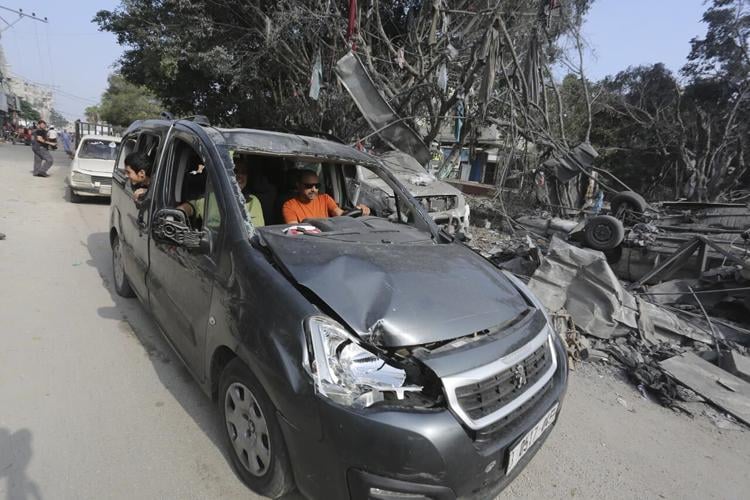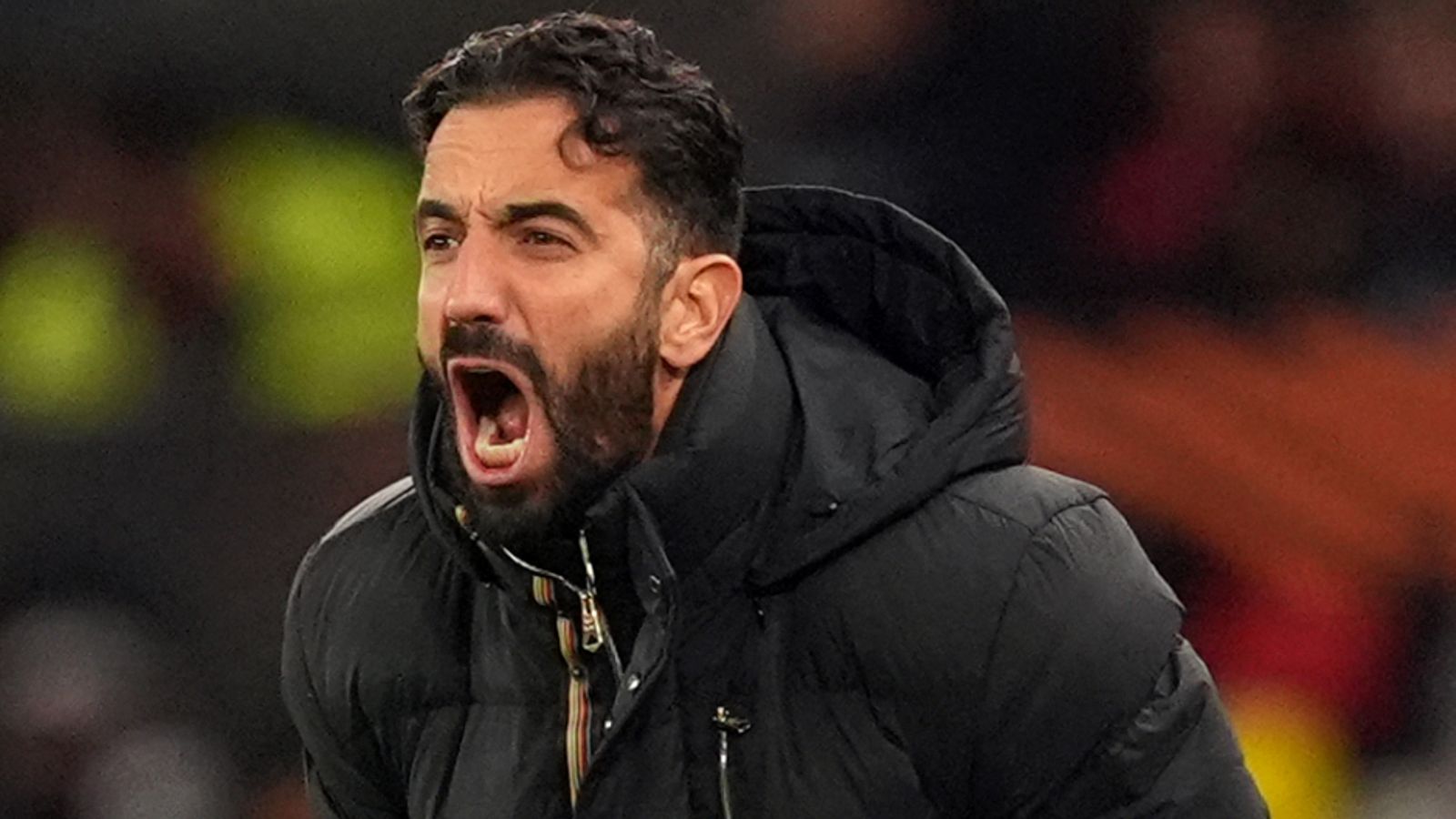Eurovision's Decision: Dismissing Israel Boycott Calls

Table of Contents
<p>The Eurovision Song Contest, a dazzling spectacle of music and cultural exchange, faced significant pressure ahead of the 2024 competition: calls to boycott Israel. This article delves into the reasons behind the European Broadcasting Union's (EBU) decision to dismiss these calls and the intricate political considerations involved. We will explore the arguments for and against the boycott, ultimately highlighting why the EBU prioritized its commitment to inclusivity and artistic expression over the contentious Eurovision Israel Boycott debate.</p>
<h2>The Arguments for Boycotting Israel in Eurovision</h2>
<h3>Human Rights Concerns</h3>
<p>The central argument for a Eurovision Israel boycott revolves around deep concerns regarding Israel's human rights record, especially its treatment of Palestinians. Proponents cite numerous violations as justification.</p>
<ul> <li>Violation of Palestinian human rights, including restrictions on movement, access to resources, and freedom of expression.</li> <li>The ongoing Israeli-Palestinian conflict and its devastating impact on civilian populations.</li> <li>The occupation of Palestinian territories and its consequences for daily life.</li> <li>The establishment of settlements in the West Bank, deemed illegal under international law by many.</li> </ul>
<p>Human Rights Watch, Amnesty International, and other reputable organizations have documented extensive evidence of these violations, providing detailed reports and testimonies supporting the claims of boycott proponents. These credible sources underscore the severity of the human rights situation and fuel the calls for a boycott.</p>
<h3>Violation of International Law</h3>
<p>Beyond human rights concerns, many argue that Israel's actions violate established international laws and norms, further justifying a Eurovision Israel boycott. </p>
<ul> <li>Allegations of violations of international humanitarian law during military operations.</li> <li>Criticisms for ignoring numerous UN resolutions concerning the occupation and settlements.</li> <li>Condemnations from international bodies like the International Criminal Court (ICC) regarding Israeli actions in Palestinian territories.</li> </ul>
<p>Specific examples, such as the blockade of Gaza and the destruction of Palestinian homes, are frequently cited as evidence of these violations. The perceived disregard for international law by Israel strengthens the arguments for those advocating a boycott.</p>
<h3>The Impact of Holding Eurovision in Israel</h3>
<p>A significant concern for boycott proponents is that hosting Eurovision in Israel normalizes its actions and provides a platform for propaganda, effectively whitewashing its human rights record. </p>
<ul> <li>Concerns that the international spotlight on Eurovision could overshadow the ongoing human rights violations.</li> <li>Fears that the event might legitimize Israel's actions on the global stage.</li> <li>The potential silencing of Palestinian voices and perspectives during the competition.</li> </ul>
<p>The argument is that hosting Eurovision in Israel could be interpreted as an implicit endorsement of its policies, undermining efforts to hold the country accountable for its actions. This fear drives the push for a boycott.</p>
<h2>The EBU's Justification for Rejecting the Boycott Calls</h2>
<h3>Commitment to Apolitical Nature of the Contest</h3>
<p>The EBU consistently maintains that Eurovision's core purpose is artistic expression, not political grandstanding. This apolitical stance underpins their rejection of the Eurovision Israel Boycott calls.</p>
<ul> <li>The EBU emphasizes its commitment to celebrating music and diverse cultures.</li> <li>They strive for inclusivity and neutrality, ensuring that all participating countries are treated equally.</li> <li>The EBU's charter explicitly outlines its dedication to remaining apolitical.</li> </ul>
<p>The EBU has issued numerous statements reiterating their commitment to keeping the contest free from political influence, stressing that a boycott would violate this fundamental principle.</p>
<h3>Concerns about Setting Precedents</h3>
<p>The EBU expressed concerns that boycotting a host country based on political disagreements would establish a dangerous precedent, potentially destabilizing future Eurovision contests.</p>
<ul> <li>The potential for future boycotts based on a wide array of political disputes.</li> <li>The difficulty in establishing objective and consistent criteria for future boycotts.</li> <li>The risk of transforming Eurovision into a platform for political point-scoring rather than artistic celebration.</li> </ul>
<p>The EBU argues that establishing a precedent of boycotts based on political considerations would fundamentally alter the nature of the competition and could lead to unpredictable and potentially divisive outcomes.</p>
<h3>The Importance of Artistic Freedom and Inclusion</h3>
<p>The EBU strongly emphasizes the importance of artistic freedom and inclusive representation, allowing artists from all nations to participate regardless of political considerations. This forms a cornerstone of their argument against the Eurovision Israel Boycott.</p>
<ul> <li>The right of Israeli artists to participate and showcase their talent on the international stage.</li> <li>The importance of diverse representation in promoting cross-cultural understanding.</li> <li>The belief that artistic exchange can foster dialogue and bridge divides.</li> </ul>
<p>The EBU contends that excluding a nation based on political disagreements would contradict the spirit of inclusivity that is central to the Eurovision Song Contest’s identity.</p>
<h2>The Ongoing Debate and Future Implications</h2>
<h3>Continued Activism and Advocacy</h3>
<p>Despite the EBU's decision, activism surrounding the Israeli-Palestinian conflict and the Eurovision Israel Boycott is likely to persist.</p>
<ul> <li>Continued efforts from pro-Palestinian groups to raise awareness about human rights violations.</li> <li>Potential for protests and demonstrations at the Eurovision event itself.</li> <li>Ongoing advocacy for a more robust response to the human rights situation in Palestine.</li> </ul>
<p>The deeply held convictions on both sides of this issue ensure that the debate will likely continue, shaping future discussions and actions regarding the Eurovision Song Contest.</p>
<h3>The Long-Term Impact on Eurovision's Reputation</h3>
<p>The controversy surrounding the boycott calls has the potential to impact public perception of the Eurovision Song Contest.</p>
<ul> <li>Potential for decreased viewership in some regions due to the controversy.</li> <li>Potential damage to the reputation of the EBU for its handling of the situation.</li> <li>Calls for greater transparency and accountability from the EBU regarding its decision-making process.</li> </ul>
<p>The long-term implications remain uncertain, and the EBU’s response to future similar controversies will be crucial in shaping the future of the competition.</p>
<h2>Conclusion</h2>
<p>The EBU's decision to dismiss calls to boycott Eurovision 2024 in Israel highlights the inherent tension between artistic expression and complex geopolitical realities. While concerns about Israel's human rights record remain undeniably valid and require continued attention, the EBU's justification prioritized its commitment to an apolitical contest and inclusivity. However, the debate surrounding the Eurovision Israel Boycott is far from settled. The ongoing conflict and passionate arguments underscore the need for sustained dialogue and critical examination of the role international events play in addressing such sensitive issues. Further discussion and analysis of the Eurovision Israel Boycott issue are crucial for a comprehensive understanding of this complex situation and its implications for the future of the Eurovision Song Contest.</p>

Featured Posts
-
 Amorims Man United Transfer Wish List Seven Players Revealed
May 14, 2025
Amorims Man United Transfer Wish List Seven Players Revealed
May 14, 2025 -
 Eurojackpot 54 Miljoonan Euron Jaettipotti Odottaa Voittajaa
May 14, 2025
Eurojackpot 54 Miljoonan Euron Jaettipotti Odottaa Voittajaa
May 14, 2025 -
 Concerto Di Beneficenza A Sanremo Musica E Pace Sostiene Al Fa Pp
May 14, 2025
Concerto Di Beneficenza A Sanremo Musica E Pace Sostiene Al Fa Pp
May 14, 2025 -
 Eurojackpot Tulokset Ja Voitot Ilta Sanomat
May 14, 2025
Eurojackpot Tulokset Ja Voitot Ilta Sanomat
May 14, 2025 -
 Selin Dion Detalna Biografiya Ta Ostanni Novini Pro Yiyi Zdorov Ya
May 14, 2025
Selin Dion Detalna Biografiya Ta Ostanni Novini Pro Yiyi Zdorov Ya
May 14, 2025
